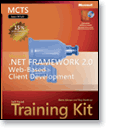Book Review: MCTS Self-Paced Training Kit (Exam 70-528): Microsoft .NET Framework 2.0 Web-Based Client Development

Technology is changing faster than ever. After ASP.NET 1.0 came out in January 2002, it took over three years for ASP.NET 2.0 to be released (in November 2005) but the latest version, ASP.NET 3.5 which has come out in November 2007 has taken a relatively smaller time frame . To add to developers' woes, most of them are perennially short of time. Therefore, learning a new technology under time constraints and becoming productive quickly is a challenge. As the book MCTS Self-Paced Training Kit (Exam 70-528): Microsoft .NET Framework 2.0 Web-Based Client Development , is based on the well-conceived certification objectives of the new Microsoft Certified Technology Specialist (MCTS) series Exam 70–528 & focuses on the essentials of ASP.NET 2.0 as they relate to the real-world, I feel it's useful for MCTS aspirants as well as those interested in ASP.NET 2.0. This is also the only 70–528 exam prep guide currently available as the Amit Kalani book is still in cold storage. In